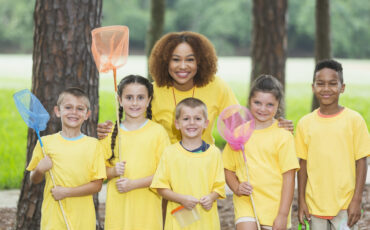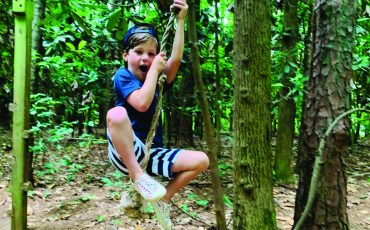Strategies for Coping with COVID-19 Lockdown and Beyond

Six months ago when the COVID-19 lockdown began, I went into organization overdrive. I set up virtual playdates, wrote daily itineraries to ensure my 11-year-old son was reading and exercising, and made a chart to keep screen time in check. We put together puzzles, organized closets and yes, even baked sourdough bread. I thought to myself, “We can do this!”
That all lasted about three weeks. And then I ugly cried.
The reality of trying to do my demanding job as a communications consultant while juggling my son’s virtual learning and the seemingly endless cooking and cleaning settled in. My son missed his buddies. And we were all managing anxiety, feelings of helplessness and concern for our friends and neighbors trying to navigate these difficult days with their own challenging circumstances.
My family’s experiences are not unique. Like many people, we take daily walks – alone and with each other around our Decatur neighborhood – to ward off the strain. We cut ourselves some slack on housework and chores. We read a lot, try to exercise, and remind each other to be grateful for the privileges we have. Yet, as summer turns to fall, the effectiveness of those strategies is wearing off. We are bickering over screen time. We are tired of the sidewalks and
sights of our neighborhood. And the internal battle between turning off the news and staying up-to-date rages on.
“We each have a unique window of tolerance,” says Katelynn Villari, a social worker and clinical director for Intown Family Therapy in Grant Park. “What might be stressful for one person is not for another. But through this prolonged period of stress, all of our windows of tolerance are closing.”
So what now?
Villari says, “For kids and families, structure and knowing of steps is something that provides a lot of emotional support, and we don’t have that right now. It isn’t easy to be comfortable with ambiguity. We can’t solve this situation, but we can control how we respond.”
That point resonated with me – and it inspired me to change up a few routines in our household.
I look for decisions I can allow my son to make. What treat should we prepare for movie night? Which direction should we go today on our walk? What cause or organization should we support? Giving him some influence helps mix up the days.
I wrote PE activities (for example, 25 jumping jacks, 30-second plank, 10 sit-ups, 60-second wall sit, etc.) on index cards, and at intervals during the day, I have my son randomly choose a card or a few – and we often do them together!
I want my son to connect virtually with friends, but they always end up playing video games. Some of that is okay – but I encourage him to tell his friends at the beginning of a call, “Let’s talk for 15 minutes before we get into a game.” And finding analog things to do – Mad Libs, a virtual book club with a few buddies – is also proving successful.
Villari also emphasizes that communication is more important than ever. “If something happens and you need a break, or the day’s schedule needs to be altered, say it out loud. Modeling that with kids shows it’s okay to express our needs and feelings.” She suggested that families purposefully and routinely check in on a high and a low, a comfortable and uncomfortable feeling of the day – and try to avoid labeling feelings as bad. My family is taking that challenge to heart – and taking one day at a time.
Table of Contents
Here are Four Ways for Everyone (Parents Included) to De-Stress:
Recreate
Research has shown that children’s stress decreases when they have access to green spaces, and movement is a great way to break up the day.
- Anne Marie: Make your backyard or block a place of wonder! Go outside with the intention of examining something in particular – such as trees. Collect and examine leaves, feel the bark, look up and imagine what the view looks like from the top. Measure its circumference, look up its species, talk about what animals might call it home.
- Kelly: Turn on some music and just dance, dance, dance! Go with the flow, and be aware of the positive change in your mind and body. Put it on the schedule every day, and let the kids choose the music.
Separate
We all need opportunities to be with our own thoughts.
- Katelynn: Avoid making time alone feel like a punishment – it’s not about anger or frustration. Work time alone into the schedule every day, and be intentional about telling children why giving each other space is good and needed – for them and for you. Even if you are in the same room, be clear about times that are for solo activities.
- Kelly: Take a walk – alone or with others – in silence. Try to be fully present. With each step notice how the ground feels beneath your feet or the wind across your skin. Take deep breaths and notice the sights, colors and sounds around you. Afterwards, reflect on what you noticed and how you felt – you might be surprised by the things you became aware of for the first time.
- Katelynn: Begin a shared journal with your family. Write messages to each other. It’s sometimes easier to write something down than to say it out loud. And, this serves as a record of how you all coped during this historic time.
Participate
Being with one another isn’t something we do just when we have time – we have to do it intentionally.
- Katelynn: Be intentional about searching for joy in the small things and point it out to your kids, your partner and yourself.
- Kelly: Create a mantra, a repeated 4-word phrase, together. I often use “peace begins with me.” Take time each day to sit up tall, legs stretched long or crisscrossed. Try closing your eyes, and using the mantra, touch each fingertip to your thumb as you say each word. As you repeat, notice how your fingers feel as your thumb taps each one. If your mind wanders, bring your attention back to what you are doing and say the mantra out loud. Mindfulness can help us to stop and pause and refocus our energy, as a result, reducing stress and anxiety.
- Katelynn: If you notice drastic changes in daily behaviors, consider seeking help from a mental health professional. We have teachers to help us with academic success, and sometimes we need support from a professional for emotional wellbeing.
Moderate
Use purposeful breaks and outdoor spaces to manage monotony and screen time fatigue.
- Kelly: Because we sit so much in front of screens, it is important to take breaks. Even if you don’t have time to get up, scan your body for tension. Relax your forehead and shoulders and unclench your jaw. Notice other places you may be unconsciously tensing up. We often hold our breath or breathe shallowly, which can cause tension in the body. Inhale through the nose as you expand your belly and your chest rises. Hold this breath for three to five seconds. Exhale through the nose as you release the breath and draw your navel to your spine. Try this breathing for as long as you like and as often as you like during the day.
- Anne Marie: Make outdoor spaces part of your home classroom. Consider what spots can you get to easily – a balcony or porch, backyard or courtyard, park or nature preserve – and have predictable places set aside for reading time, recess and other aspects of learning from home.
Thank you to our local experts who offered insight and ideas.
- Katelynn Villari is a licensed social worker and the clinical director at Intown Family Therapy in Grant Park. She supports families in private practice and in the community, including serving as a counselor at the Global Village Project, a nonprofit school for refugee girls. intownfamilytherapy.com
- Anne Marie Hoffman, a native of Atlanta, grew up enjoying the outdoors with her family. A scientist by training, she has developed and taught nature-based curriculum around the world. Today, she offers guided hikes, virtual camps and other outdoor experiences for families with young children. tykehike.com
- Kelly McCool is certified in multiple forms of yoga, and she is an experienced elementary school teacher. Through her business, McCool Kids Yoga, she teaches a variety of parent and child classes around Atlanta and online. mccoolkidsyoga.com
– Sherry V. Crawley







